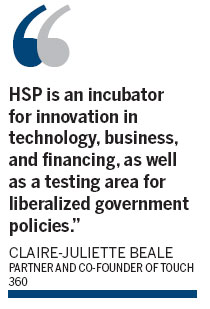Where enterprises interact with the international media
Updated: 2011-09-15 07:49
By Xu Xiao (China Daily)
|
|||||||||||
While technological developments and buzzwords may be everyday stuff in the developed world these days, they are becoming no less so in China, especially in a science park in Beijing, where they have even gotten some more attention.
At least they have, by Thomas Seifert, a correspondent from a leading Austrian newspaper, Die Presse. He is writing a book on innovative industries in emerging countries and visited Beijing's Zhongguancun Haidian Science Park (HSP) recently for his research.
Seifert heard about the park for the first time a year ago at the 2010 Tianjin Davos. For one thing, it has encouraged its enterprises to interact with international media, more openly, as a means of promoting themselves and to give other countries a better understanding of China's real developments and innovations.
Zhang Xiuying, deputy head of management at HSP, first met Seifert at the 2010 Tianjin Davos Forum, and since the European reporter was curious about the emerging Far East, Zhang wanted to use the opportunity.
The Zhongguancun National Innovation Demonstration Zone is one of China's leading experimental zones for economic reforms, and HSP is more or less at the core.

"HSP is an incubator for innovation in technology, business, and financing, as well as a testing area for liberalized government policies," said Claire-Juliette Beale, partner and co-founder of Touch360 who visited HSP on August 2007.
"It will be the main way we can learn about the development of creative industries in China and see how the government supports creative, high-tech industries," Seifert said.
"The innovative environment in HSP really impressed me," after talking with the HSP management and enterprises such as Innovation Works, and Doodle - a cell phone game research and development company.
Huang Ying, deputy head of HSP's international department has said that they give the media whatever services they need by arranging interviews and supplying background information.
Seifert has also visited the cities of Chengdu and Chongqing, in Sichuan province, which help transfer innovative businesses to central and western parts of China.
Outside of China, he has visited enterprises in India and Singapore, to make a comparison and get a broader perspective.
"I believe that, after my book is published, European stereotypes on China - for example, that there is no creativity or technology - will change. And more foreign capital will be attracted to China," Seifert added.
"And I'm sure that more young, talented people will come to work in the HSP and in creative industries. And more creative companies or independent brands similar to Baidu, Tencent or Vancl will appear."
Zhang, the management head, called this an important opportunity for HSP to get itself on foreigners' lists of good places to visit in Asia, which will increase communication.
In fact, HSP's cooperation with Seifert is just one part of its larger "iBridge" strategy, to improve cooperation with other parts of the world.
In March 2011, Robert Burns, the vice-president of Lux Research Inc, an independent research and advisory firm providing strategic advice on emerging technologies, visited HSP and decided to cooperate, immediately afterwards.
In following up, Burns sent three groups of Lux staff members to HSP, in one month, to arrange ways to cooperate.
In 2006, HSP cooperated with Hong Kong Phoenix TV's European channel to show its development to the outside, as a way to demonstrate iBridge's effectiveness, officials have said.
Seifert's assistant told China Daily that Seifert is about ready to wrap up his year of Asian research and start writing his book.
In a note of thanks to HSP, he said the park does not just support IT industries, but all sorts of high-tech enterprises and that he was impressed by the effortless support it gives enterprises.
"Any enterprise with innovative thinking can be nurtured in HSP and become a forerunner in its field."
(China Daily 09/15/2011 page18)